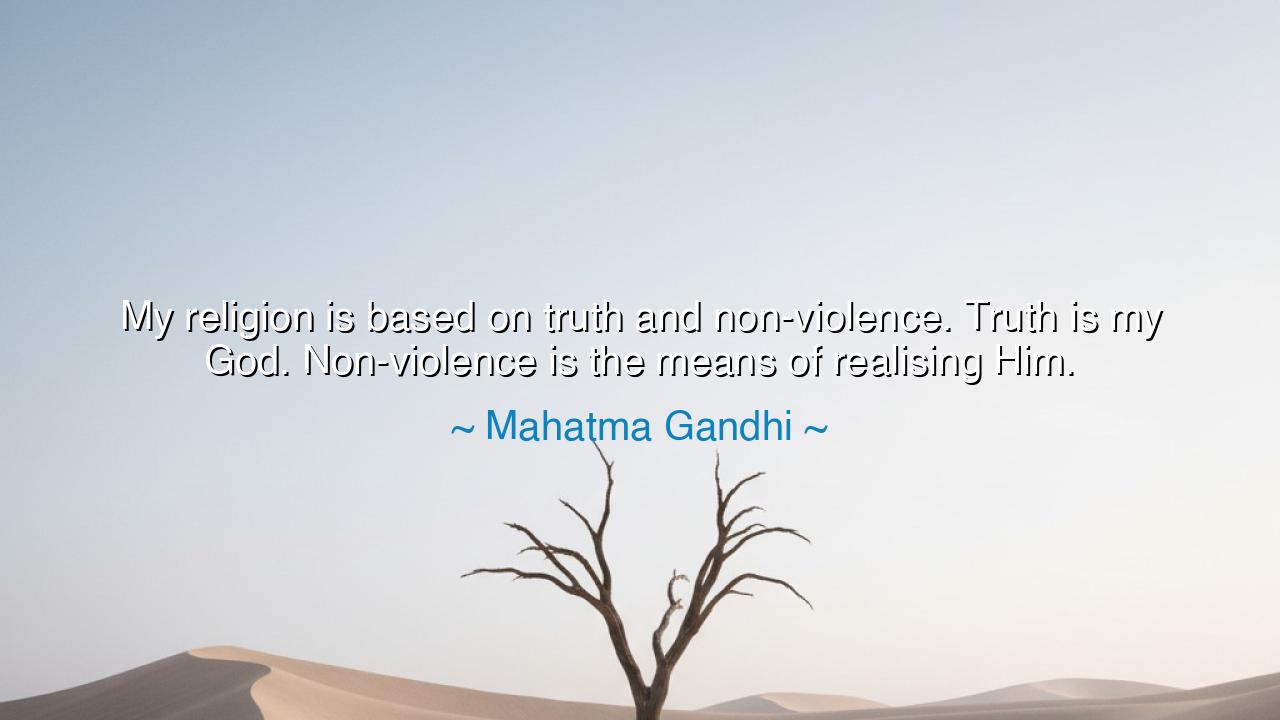
My religion is based on truth and non-violence. Truth is my God.
My religion is based on truth and non-violence. Truth is my God. Non-violence is the means of realising Him.






In the vast and eternal pursuit of truth, there exists a path that leads us not only to understanding but to inner peace and spiritual enlightenment. Mahatma Gandhi, the towering figure of non-violence and human dignity, revealed a profound truth when he said, "My religion is based on truth and non-violence. Truth is my God. Non-violence is the means of realizing Him." These words are more than a simple reflection on faith; they are a call to a higher, universal truth, one that transcends mere belief systems and reaches into the very soul of existence. To Gandhi, truth was not just an abstract concept, but the essence of life, and non-violence was the purest expression of this truth.
In the ancient wisdom of the Vedas, truth is considered the highest principle, the guiding force that governs the universe. The Hindu sages spoke of Satya, or truth, as the foundation of dharma, the moral order that binds the universe together. To live in alignment with Satya was to live in harmony with the divine, to embody the very essence of the cosmos. Gandhi, deeply influenced by this ancient understanding, saw truth as not just a philosophical idea but as the divine force that connects all of humanity. Truth, in Gandhi’s view, is not simply about facts or knowledge but about a profound alignment with the highest moral and spiritual principles.
The essence of Gandhi’s religion was rooted in this understanding of truth, but he also recognized that the path to realizing truth requires a profound commitment to non-violence, or ahimsa. Non-violence, for Gandhi, was not just the absence of physical harm but the active cultivation of love, compassion, and respect for all beings. It was through non-violence that we could truly live out truth, for violence, in any form, distorts the purity of our connection to the divine. The ancients understood this as well—Buddha taught that compassion and non-violence were central to the path of enlightenment, while Jesus spoke of loving one's enemies, turning the other cheek, and living in harmony with others. To Gandhi, non-violence was not just a tactic for political struggle but a way of life—a spiritual discipline that required deep internal commitment and unwavering resolve.
Consider the transformative example of Gandhi's Salt March in 1930, a non-violent protest against British colonial rule. In this historic act of civil disobedience, Gandhi embodied his belief in non-violence as the means to realize the truth of Indian independence. His defiance was not violent; it was a humble, yet powerful assertion of the moral truth that the people of India had the right to freedom and self-rule. Through this act of peaceful resistance, Gandhi showed the world that truth and non-violence are not passive concepts, but active, transformative forces that can change the world. His commitment to non-violence became the cornerstone of his entire movement, inspiring countless others, from Martin Luther King Jr. to Nelson Mandela, to adopt the power of peaceful protest in their own struggles for justice.
In the ancient stories of the Bodhisattvas, beings who are dedicated to the liberation of all sentient beings, we find a similar embodiment of non-violence. The Bodhisattvas vow not to enter Nirvana until all beings are free from suffering, demonstrating the profound compassion and selflessness that is the hallmark of true non-violence. Like Gandhi, they understand that to protect and uplift the truth of the human spirit, one must act with love, kindness, and understanding, never through force or harm. The power of non-violence lies not in its weakness, but in its ability to break down the barriers of hatred and oppression without causing destruction.
The lesson Gandhi offers us is as timeless as it is vital: truth is the highest calling of the human spirit, and the path to realizing that truth is through non-violence. In our own lives, we must not only seek truth through knowledge or philosophy but also through the way we treat others. Non-violence, in all its forms—whether physical, emotional, or verbal—is the means by which we can align ourselves with the highest truths of the universe. It is through compassion, love, and a deep respect for life that we truly connect with the divine, just as Gandhi did.
In our modern, often turbulent world, Gandhi’s message calls us to reflect on how we live, how we treat others, and how we align our actions with our deepest moral convictions. Are we committed to truth in our lives, or do we succumb to the pressures of convenience, fear, and selfishness? Are we acting with non-violence, not just in the literal sense, but in the way we engage with the world and its injustices? The path of truth and non-violence is not easy, but it is the path that leads to true transformation—both within ourselves and in the world around us. Let us walk this path with courage, humility, and a deep commitment to the higher principles of love, compassion, and truth.






AAdministratorAdministrator
Welcome, honored guests. Please leave a comment, we will respond soon